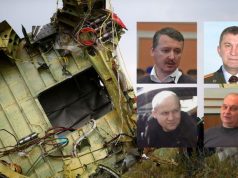

At a time when all seemed lost, his announcement was a welcome turning point in the stand-off between the international rescue teams and people who were in command over large swathes of land near the Russian border where the Boeing 777 aircraft had tragically crashed.
Najib deftly held his emotions in check when he said that in recent days, he had “wanted to give greater voice to the anger and grief the Malaysian people felt about the incident.” “But sometimes, we must work quietly in the service of a better outcome,” he said at a nationally-televised press conference.


“But we felt an obligation to explore all avenues to break the impasse, and secure the return of the remains and the black boxes. After meeting the families (of the crash victims), I felt that we owed it to them to act,” he said.
Meanwhile, Malaysia’s ‘triumph’ has certainly evoked envy among some quarters. Paul Sonne, a Wall Steet Journal correspondent in Moscow, poured cold water on the breakthrough and wondered in his tweet whether the Malaysian negotiators knew what they had signed with Alexander Borodai and his men.


But in their behind-the-scenes work, the negotiators focused on what was uppermost on their minds — securing what was most crucial in these moments of great anguish: the release of the victims’ bodies, black boxes and access to the crash site in Grabove. This brings to mind a saying by St Francis of Assisi: “Start by doing what’s necessary; then, do what’s possible; and suddenly, you are doing the impossible.”
So, it was a matter of priority for the negotiators to have the bodies brought back for one last close moment with their loved ones. Or getting a proper burial or funeral rights for those who had lost a father, mother, sister, brother, child or friend.
Emotions aside, securing the black boxes to find out what really happened in the air before the aircraft came down and having unimpeded passage for the international investigators to the crash site were other significant tasks.


Despite the latest breakthrough, Najib did not gloat over it and provided great compassion and solace in his statement when he said: “I understand that for the families, nothing can undo this damage.
The lives taken cannot be given back, the dignity lost cannot be regained. “My heart reaches out to those whose loved ones were lost on MH17. We hope and pray that the agreement reached helps to bring them a clear step towards closure,” he said.
-BERNAMA










